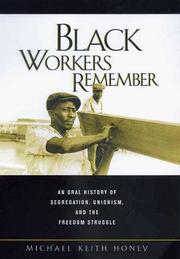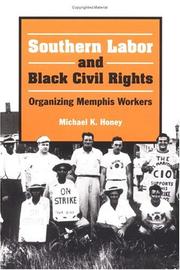| Listing 1 - 7 of 7 |
Sort by
|

ISBN: 0520928067 058527634X 9780520928060 9780585276342 0520217748 9780520217744 Year: 1999 Publisher: Berkeley, [Calif.] ; London : University of California Press,
Abstract | Keywords | Export | Availability | Bookmark
 Loading...
Loading...Choose an application
- Reference Manager
- EndNote
- RefWorks (Direct export to RefWorks)
"The labor of black workers has been crucial to economic development in the United States. Yet because of racism and segregation, their contribution remains largely unknown. This work tells the hidden history of African American workers in their own words from the 1930s to the present. It provides first-hand accounts of the experiences of black southerners living under segregation in Memphis, Tennessee, the place where Martin Luther King, Jr., was assassinated during a strike by black sanitation workers. Eloquent and personal, these oral histories comprise a unique primary source and provide a new way of understanding the black labor experience during the industrial era. Together, the stories demonstrate how black workers resisted apartheid in American industry and underscore the active role of black working people in history."--Jacket.
African Americans --- Labor movement --- African American labor union members --- Race discrimination --- Afro-Americans --- Trade-unions --- Black Americans --- Colored people (United States) --- Negroes --- Africans --- Ethnology --- Blacks --- Bias, Racial --- Discrimination, Racial --- Race bias --- Racial bias --- Racial discrimination --- Discrimination --- Labor and laboring classes --- Social movements --- African American members of labor unions --- Afro-American labor union members --- Labor union members, African American --- Labor unions --- Labor union members --- Employment --- History --- Social conditions. --- History. --- Afro-American membership --- African American membership --- United States --- Race relations. --- Race question --- Black people

ISBN: 0252020006 Year: 1993 Publisher: Urbana University of Illinois Press
Abstract | Keywords | Export | Availability | Bookmark
 Loading...
Loading...Choose an application
- Reference Manager
- EndNote
- RefWorks (Direct export to RefWorks)

ISBN: 0252063058 Year: 1993 Publisher: Urbana Chicago University of Illinois Press
Abstract | Keywords | Export | Availability | Bookmark
 Loading...
Loading...Choose an application
- Reference Manager
- EndNote
- RefWorks (Direct export to RefWorks)
Book
ISBN: 9780393356731 Year: 2018 Publisher: New York W.W. Norton
Abstract | Keywords | Export | Availability | Bookmark
 Loading...
Loading...Choose an application
- Reference Manager
- EndNote
- RefWorks (Direct export to RefWorks)
Fifty years ago, a single bullet robbed us of one of the world’s most eloquent voices for human rights and justice. To the Promised Land goes beyond the iconic view of Martin Luther King Jr. as an advocate of racial harmony to explore his profound commitment to the poor and working class and his call for "nonviolent resistance" to all forms of oppression, including the economic injustice that "takes necessities from the masses to give luxuries to the classes." Phase one of King’s agenda led to the Civil Rights and Voting Rights acts. But King also questioned what good it does a person to "eat at an integrated lunch counter if he doesn’t earn enough money to buy a hamburger and a cup of coffee?" In phase two of his activism, King organized poor people and demonstrated for union rights while seeking a "moral revolution" to replace the self-seeking individualism of the rich with an overriding concern for the common good. “Either we go up together or we go down together,” King cautioned, a message just as urgent in America today as then. To the Promised Land challenges us to think about what it would mean to truly fulfill King’s legacy and move toward his vision of "the promised land" in our own time.
Book
ISBN: 0807086010 Year: 2011 Publisher: Boston : Beacon Press,
Abstract | Keywords | Export | Availability | Bookmark
 Loading...
Loading...Choose an application
- Reference Manager
- EndNote
- RefWorks (Direct export to RefWorks)
Overview: An unprecedented and timely collection of Dr. King's speeches on labor rights and economic justice. People forget that Dr. King was every bit as committed to economic justice as he was to ending racial segregation. He fought throughout his life to connect the labor and civil rights movements, envisioning them as twin pillars for social reform. As we struggle with massive unemployment, a staggering racial wealth gap, and the near collapse of a financial system that puts profits before people, King's prophetic writings and speeches underscore his relevance for today. They help us imagine King anew: as a human rights leader whose commitment to unions and an end to poverty was a crucial part of his civil rights agenda. Covering all the civil rights movement highlights-Montgomery, Albany, Birmingham, Selma, Chicago, and Memphis-award-winning historian Michael K. Honey introduces and traces King's dream of economic equality. Gathered in one volume for the first time, the majority of these speeches will be new to most readers. The collection begins with King's lectures to unions in the 1960s and includes his addresses during his Poor People's Campaign, culminating with his momentous "Mountaintop" speech, delivered in support of striking black sanitation workers in Memphis. Unprecedented and timely, "All Labor Has Dignity" will more fully restore our understanding of King's lasting vision of economic justice, bringing his demand for equality right into the present.
Employee rights. --- Social rights. --- Employee rights --- Social rights --- King, Martin Luther,
Book
ISBN: 9780520387850 Year: 2022 Publisher: Oakland, California : University of California Press,
Abstract | Keywords | Export | Availability | Bookmark
 Loading...
Loading...Choose an application
- Reference Manager
- EndNote
- RefWorks (Direct export to RefWorks)
A persuasive account of the philosophy and power of nonviolence organizing, and a resource for building and sustaining effective social movements. Despite the rich history of nonviolent philosophy, many people today are unfamiliar with the basic principles and practices of nonviolence--even as these concepts have guided so many direct-action movements to overturn forms of racial apartheid, military and police violence, and dictatorships around the world. Revolutionary Nonviolence is a crucial resource on the long history of nonviolent philosophy through the teachings of Rev. James M. Lawson Jr., one of the great practitioners of revolution through deliberate and sustained nonviolence. His ongoing work demonstrates how we can overcome violence and oppression through organized direct action, presenting a powerful roadmap for a new generation of activists. Rev. Lawson's work as a theologian, pastor, and social-change activist has inspired hope and liberation for more than sixty years. To hear and see him speak is to experience the power of the prophetic tradition in the African American and social gospel. In Revolutionary Nonviolence, Michael K. Honey and Kent Wong reflect on Rev. Lawson's talks and dialogues, from his speeches at the Nashville sit-in movement in 1960 to his lectures in the current UCLA curriculum. This volume provides a comprehensive introduction to Rev. Lawson's teachings on how to center nonviolence in successfully organizing for change.
Nonviolence. --- Lawson, James M., --- 21st century activism. --- books for activists. --- civil rights. --- freedom. --- guide. --- how to be an activist. --- how to organize. --- kamala harris. --- labor rights. --- learnings. --- martin luther king jr. --- nonviolence. --- philosophy. --- riots. --- social change. --- teachings.
Digital

ISBN: 9780813555058 Year: 2004 Publisher: New Brunswick, N.J. Rutgers University Press
Abstract | Keywords | Export | Availability | Bookmark
 Loading...
Loading...Choose an application
- Reference Manager
- EndNote
- RefWorks (Direct export to RefWorks)
| Listing 1 - 7 of 7 |
Sort by
|

 Search
Search Feedback
Feedback About UniCat
About UniCat  Help
Help News
News